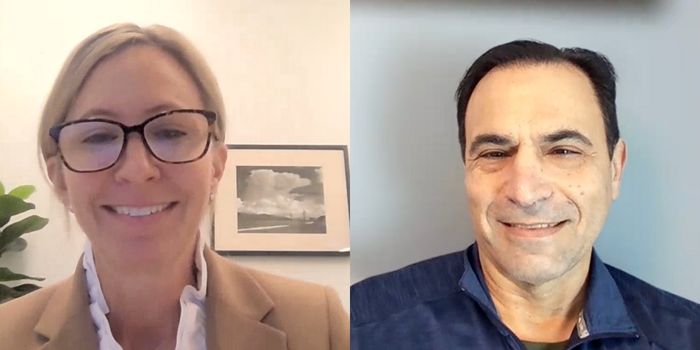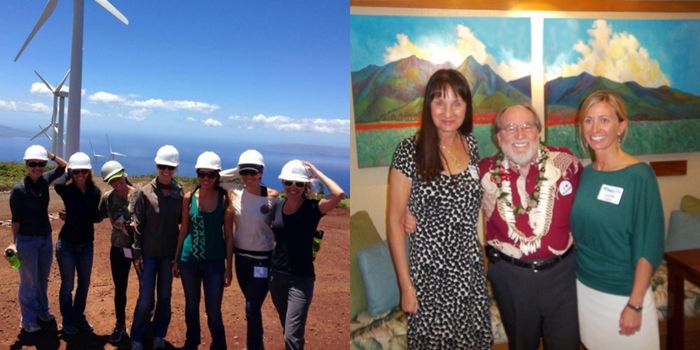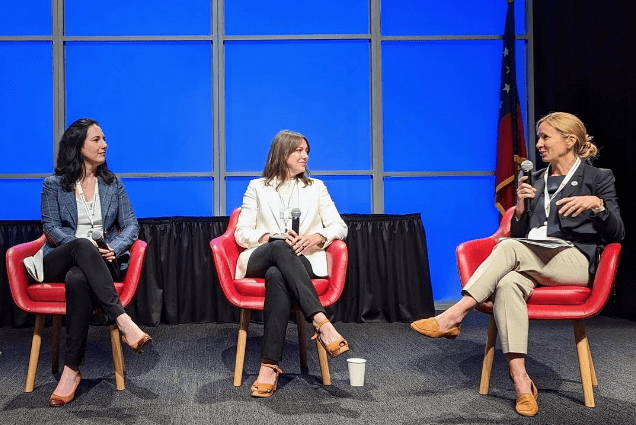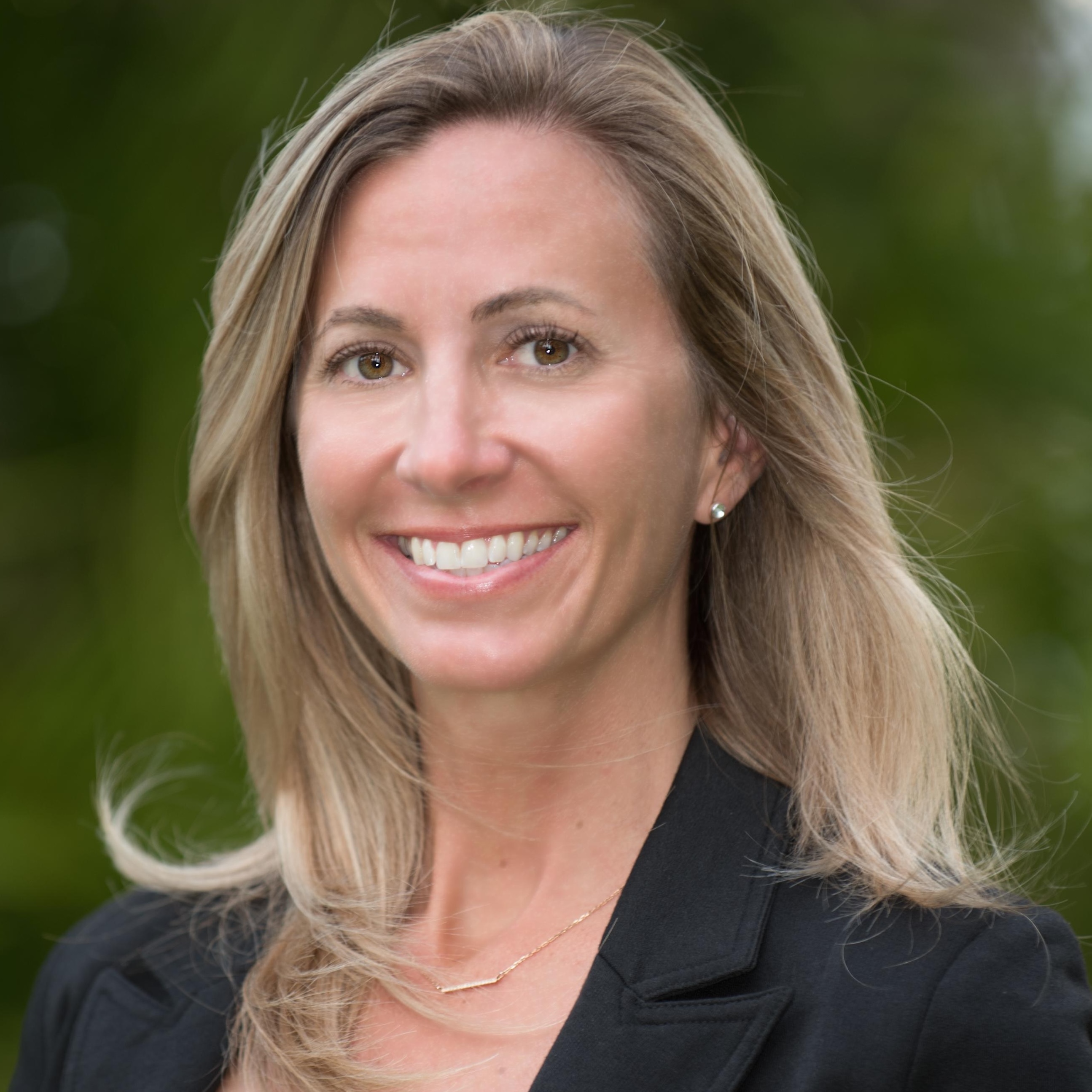For the past two and half years, Jennifer Chirico (Mgt ’97, PhD PP ’11) has been leading efforts to make the Georgia Tech campus more sustainable. As the inaugural associate vice president for sustainability, the proud Double Jacket works with the Infrastructure and Sustainability team to make sure our campus is making strides toward lowering emissions and waste while also saving the Institute money. This “everybody wins” scenario is good for the planet, our community’s health and wellbeing, and the Institute’s bottom line. Jennifer began her academic journey at Georgia Tech as a management major with a focus in finance. Following graduation and working for a couple of years in corporate America, she traveled to Hawaii, looking to find her purpose. Luckily, she found it in spades. Immersed in the raw natural beauty of the islands, Jennifer learned about environmental issues and the vulnerabilities of remote islands. In the early 2000s, further travels and work in Hawaii, New Zealand, Australia, and East Asia sparked her interest in working at the intersection of finance, environmental health, and social issues: the three primary components of the new (at the time) field of “sustainability.” Jennifer now applies lessons learned from a career in sustainability to making Georgia Tech a world-class campus. On February 19, 2025, Michael Oxman, managing director of the Ray C. Anderson Center for Sustainable Business (Center) sat down for a conversation with Jennifer. In addition to working together in the Georgia Tech sustainability ecosystem, Jennifer and Michael also discovered that coincidentally, in previous roles, they had both contributed to the development and launch of the Auwahi Wind Farm in Maui. The Center is pleased to share highlights from their conversation.

Michael Oxman (MO): Thanks for taking the time to talk with me. Would you start by sharing your background leading up to college?
Jennifer Chirico (JC): Of course! I grew up outside of Atlanta, and my father went to Georgia Tech. It was my dream to attend Tech, and I worked really hard to make that happen. I studied management and found my place in finance as an undergraduate student.
MO: What did you do after graduation?
JC: I worked in a corporate role as an investment consultant. I loved working with numbers, but I also had an interest in environmental issues. While working in finance, I had an opportunity to move to Hawaii. I was early in my career and so I took the risk and moved.
MO: Was that where your sustainability passion kicked into gear?
JC: Yes, I was there for a year and fell in love with the islands and the beauty and nature. During that time, I received a scholarship for a year in New Zealand. This was the year 2000, and it was when I first started to hear the word “sustainability.” I was living at a retreat center where every weekend, they hosted workshops. Sustainability was a common theme. People from all over the world came to talk about topics like energy, water, and waste. I was lucky to get a free education (that I wasn’t expecting!) in sustainability.
MO: What did you do after New Zealand?
JC: I travelled in Australia and Southeast Asia and spent time learning about different cultures and economies. In Laos, the social issues from environmental destruction became very apparent. I saw children playing in and women collecting water from the Mekong River, where I would also see people dumping all of their trash. That was my start of wanting to connect environmental health to social issues.
MO: How did you pursue that interest?
JC: I decided to pursue my masters in public health with a focus on environmental health in Oregon. They were offering some of the first sustainability classes in the country. I took those classes as electives; they represented the nexus of my interests in finance, the environment, and social issues.
MO: Where did you go after getting your degree?
JC: Booz Allen Hamilton hired me to do consulting for the environmental health department of the CDC in Atlanta. With my background in finance, I often ended up managing the project financials instead. I always knew I wanted to pursue a PhD, so I also started looking into PhD programs. It turned out that one of the top scholars in sustainability at that time was Bryan Norton in the School of Public Policy at Georgia Tech. I was accepted into the PhD program and focused on environmental policy. Bryan was on my dissertation committee, and later, I authored a chapter in his book.
MO: What was your dissertation on?
JC: I focused on sustainability challenges on remote islands with Hawaii as my case study. It is highly dependent on imports of food and oil and faces challenges in exporting and diverting waste due to its remote location. I spent time in Hawaii doing my field research when my life took another direction – when I accepted a new position as the executive director of the Sustainable Living Institute of Maui at the University of Hawaii. It was a dream job!
MO: You took that role while you were still in graduate school?
JC: Yes, I was still working on my dissertation. I took the job in 2009 and defended my dissertation the next year.

MO: What type of work did you do in the role?
JC: I was involved in setting up sustainability programs across the state. Most of those programs – in energy efficiency, renewables, water management, sustainable agriculture, wastewater, and more – are still going today! I was one of only a few people in sustainability back then and was tapped for some incredible opportunities, such as presenting to the presidents of Tahiti and Palau. I also started getting requests to do consulting on the side. I eventually moved into consulting full time. It was an exciting time. I had the privilege to work with many of the largest organizations in the state and many global corporations.
MO: What prompted your move back to Atlanta?
JC: Covid was quite a shock and isolating due to being on a remote island nearly 2,500 miles from the next nearest landmass. The small island towns were boarded up, and there was only one flight a day off the island for about eight months. I couldn’t leave to go back to visit family. I didn’t want to be in that situation again. My husband and I decided to move back to Atlanta. I applied for the role of Georgia Tech’s inaugural associate vice president of sustainability – and got it. I’ve been working at Tech for two and half years.
MO: How does it feel to be working at your alma mater?
JC: Coming back to Georgia Tech to do sustainability work was exciting – I feel like I am giving back to my hometown and where I was educated.
MO: Tell us about some of the key initiatives that you’ve been leading.
JC: When I started the job, I was made co-chair of Sustainability Next, which was tasked with providing a roadmap for campus sustainability. I also developed and completed the Institute’s first Climate Action Plan (CAP) for the Institute. That was a big effort! In my opinion, one of the big successes for the CAP is that it is feasible and realistic – not idealistic. It’s a good road map for making our campus more efficient and cost effective. I also led the effort to develop the Institute’s first sustainable procurement guide, Scopes 1-3 emissions inventory, zero waste task force, and Living Learning Campus.

MO: Was the CAP a slam dunk in terms of getting people’s buy-in?
JC: Overall, leadership was supportive. The biggest challenge was stakeholder engagement. Everyone had different opinions on the best path forward. But I knew it needed to be financially feasible, or it was going to sit on a shelf.
MO: Generically speaking, if there’s no disagreement through stakeholder engagement, it’s probably not stakeholder engagement. It would be stakeholder informing [laughs]. Switching gears, would you talk about the Living Campus initiative?
JC: The Living Learning Campus came out of Sustainability Next. My team wanted a way for students and faculty to use our energy, water, waste, and emissions data. In essence, we wanted to make the campus a living lab to advance sustainability. Last year, we launched the Living Campus Pathways. There are three pathways: 1) students or faculty can put in a request to use data, and our team is not otherwise involved; 2) students, faculty, and staff can work on a project that is alignment with our goals, and our team can provide data and answer questions to move the work along; and 3) students can apply for our fellowship program. Last year, our fellows worked on many projects to advance sustainability on campus, such as a campus electric bikeshare program, biodiversity, pedestrianization, and developing a zero waste dashboard. I couldn’t be more proud of the work they completed. This year, we plan to launch a fourth pathway for research.
MO: What advice would you give to students who want to get involved in this space?
JC: First, I think it’s important to learn at least the basics of finance so you can learn how to achieve positive ROI and cost savings. Second, learn and understand the importance of social and environmental issues and how they affect the health of ourselves and our economy. Third, find where your talent meets your passion.
MO: And finally, what do you do when you’re not working?
JC: Anything outdoors makes me happy. I love being in the mountains and by the water. I’m also an avid reader and believe books and stories help us better understand people and the world more deeply. And, most importantly, my favorite thing to do is spend quality time with my husband, family, friends, and dogs.
MO: Thanks for sharing your story, Jennifer.
JC: My pleasure!
As told to Jennifer Holley Lux
